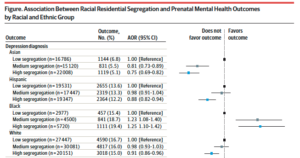Separate areas related to depression, anxiety during pregnancy
Black pregnant women at higher risk, Kaiser Permanente study finds
Neighborhood segregation caused by racism against Black Americans may be linked to stress and anxiety during pregnancy, according to new Kaiser Permanente research. The study was published in JAMA Health Forum.
Researchers from the Kaiser Permanente Division of Research examined the concentration of one race or ethnicity in a particular area, divided by high, medium or low residential segregation. They examined whether living in a highly segregated area is associated with higher rates of depression and anxiety among pregnant patients across racial and ethnic groups receiving care through Kaiser Permanente Northern California (KPNC).

They found that for Blacks, living in a highly segregated neighborhood was associated with higher odds of depression and anxiety during pregnancy. However, among Asian, Hispanic, and White pregnant patients, higher residential segregation was associated with lower levels of depression and anxiety.
“Our study examines one form of racial discrimination—residential segregation—and provides evidence of how these factors are associated with poor health outcomes among Blacks,” the said co-author Kendria Kelly-Taylor, PhD, a DOR researcher. “These findings support a growing body of literature showing racial residential segregation is associated with health disparities between Black and White Americans.”
The effects of housing discrimination may vary by race and ethnicity, the authors said. They stated that racial residential segregation is the result of practices, policies and laws that reduce economic investment from racially based housing and zoning restrictions, thus creating and reinforcing racial inequality by reducing opportunities for economy and education. The authors also believe that racial and ethnic groups can stay together for legitimate reasons, such as seeking community and support from others with similar backgrounds.
Although this study did not examine the reasons for the differential effects of residential segregation on mental health during pregnancy, the study’s findings provide important evidence that neighborhood socioeconomic conditions have an impact on convenience.
Kelly-Taylor said: “What we found is another part of the story that is more complicated. “We looked at the racism that has formed and affected society over the years. These research studies, and many others, are beginning to answer the question of how we can research structural factors and their impact on achieving health equity. ”
Other factors that future research might consider include subgroups of each race or ethnicity, nativity (US-born or not-US-born), immigrant status , and length of stay in the neighborhood.

“This type of research is very important to develop public policies to help the pregnant population, and to prevent depression and anxiety during pregnancy,” said senior author Lyndsay Avalos, PhD, MPH, research scientist. of DOR. “These major social factors need to be explored to develop policies and measures to ensure the health and well-being of mothers and families.”
Researchers reviewed the records of 201,115 KPNC patients who were pregnant between 2014 and 2019 and self-identified as Asian, Black, Hispanic or White. Participants’ addresses were linked to demographic status estimates. The researchers used a commonly used measure of segregation to categorize neighborhoods and made separate comparisons for each racial or ethnic group of low versus moderate discrimination, and low versus and high.
They found the highest rates of depression and anxiety among Black pregnant women (18.3% and 18.4%, respectively); followed by Whites (16.0%, 18.2%), Hispanics (13.0%, 14.4%), and Asians (5.7%, 6.4%) respectively.
Asians and Blacks tended to live in very segregated areas. High racial segregation was associated with 25% higher odds of prenatal depression and 14% higher odds of maternal anxiety among Blacks.
Conversely, higher racial segregation was associated with lower odds of depression and anxiety among Asians and Hispanics, and lower odds of depression among Whites.
The study also highlighted that Black people living in highly segregated areas had a lower percentage of people with a college degree and a higher percentage of people with Medicaid health insurance. “The negative economic consequences of long-term forms of racism such as racial discrimination in housing can be counterproductive. [any] “Cultural and social protective factors that result from living in the middle of a person’s race, especially for Black pregnant women,” the authors wrote.

Higher racial segregation for Whites appeared to be protective against depression during pregnancy. These neighborhoods were also economically disadvantaged.
The authors say they focused on examining mental health during pregnancy because it is a vulnerable time in life. Kelly-Taylor said: “Pregnancy is a vulnerable time where health conditions experienced during this period can have a lasting impact on the health of both mother and child.” “And these effects can have multigenerational health consequences.”
The study team plans to continue to examine how design practices affect mental health during pregnancy, said co-author Sylvia Badon, PhD, a DOR research scientist. “We plan to delve into some of the patterns of these relationships and how they differ between races and ethnicities, thinking about the interaction between economic conditions and social and cultural relationships that can undermine the negative impact on health. of the mind to live in an empty space. economic opportunity,” said Badon.
This study was funded by a Kaiser Permanente Community Health Policy and Disparities Research grant and the National Center for Child Health and Human Development.
Additional authors were Wendy T. Dyer, MS, Alex Asera, MPH, Huyun Dong, MPH, Tess Baker, Nerissa Nance, Charles Quesenberry, PhD, and Kelly Young-Wolff, PhD, MPH, of the Group Research; Mibhali Bhalala, MD, and Kathryn Erickson-Ridout, MD, PhD, of The Permanente Medical Group; and Kiarri N. Kershaw, PhD, of Northwestern University Feinberg School of Medicine.
###
About the Kaiser Permanente Research Department
The Kaiser Permanente Division of Research conducts, publishes and disseminates epidemiological and health services research to improve the health and medical care of Kaiser Permanente members and the general public. It seeks to understand the determinants of illness and health, and to improve the quality and cost-effectiveness of health care. Currently, DOR’s 600-plus employees are working on more than 450 disease and health services research projects. For more information, visit divisionofresearch.kaiserpermanente.org or follow us @KPDOR.
#Separate #areas #related #depression #anxiety #pregnancy